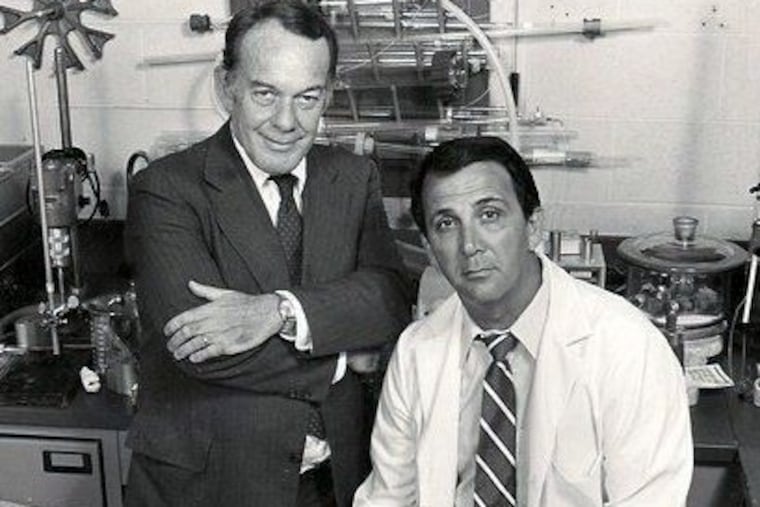Paul A. Liberti, immunologist, biochemist, and biomagnetic entrepreneur, dies at 84
He was an innovator and inventor whose work impacted science and medicine academically and entrepreneurially.

Paul A. Liberti, 84, of Naples, Fla., a celebrated professor of biochemistry and immunology at Thomas Jefferson University’s medical college, and the founder of several pioneering biomagnetic companies, died Monday, Jan. 18, of gastrointestinal bleeding at his home.
A visionary in both academia and business, Dr. Liberti, one online biography said, was “an innovator and inventor whose work has had significant impact in science and medicine both academically and entrepreneurially.”
Dr. Liberti directed research and educational programs at Jefferson that studied the physical chemistry of antigen-antibody reactions. Later, he founded and directed two companies, Immunicon Corp. of Huntingdon Valley and BioMagnetic Solutions of State College, that invented ways to better separate and characterize circulating tumor cells that could predict metastatic breast, prostate, and colorectal cancer outcomes.
In 2009, his work on CellSearch, an FDA-approved system for isolating and analyzing tumor cells from blood, was recognized by the New York-based Galien Foundation as the country’s best medical technology.
Dr. Liberti also worked at the National Institute of Medical Research in London and as a consultant to other biotech firms, and founded three other companies associated with innovation and magnetic technology. He held 64 U.S. patents.
“He loved to solve problems,” said his son Ted. “He had the capacity to take in complex things, understand them, and make them understandable to others.”
Dr. Liberti was born March 18, 1936, in Lyndhurst, N.J. He was valedictorian of his senior class at Lyndhurst High School in 1954, and went on to receive a bachelor’s degree in chemistry from Columbia College, a master’s degree in biochemistry from Loyola University, and a doctorate in physical chemistry from Stevens Institute of Technology.
He began his career in 1967 as a professor of biochemistry and immunology at Jefferson Medical College. He established a large award-winning research program and directed postdoctoral studies in immunology for which he was praised for making complex issues comprehensible to his students.
In 1983, he founded Immunicon Corp., which was acquired in 2008 by Johnson & Johnson. There, he developed, among other things, high gradient magnetic devices and cell separation technologies.
In 2011, he cofounded BioMagnetic Solutions with his son and directed the development of an immuno-magnetic cell selection system with applications in gene therapy. He also founded companies that created and marketed novel clothes hangers and hanging systems, and large-scale water remediation processes.
Despite his entrepreneurial success, Dr. Liberti knew the risks of creating new companies. In 1992, he told The Inquirer that “terror” was the best way to describe life as a medical and scientific businessman. “I think that’s part of running a business,” he said. “You learn to live with a lot of terror.”
Dr. Liberti married Raema Francis in 1961, and they raised four children in Churchville: Paul, Ted, Roseanne, and Joseph. They divorced in 1994. He married Caroline Culley Stine in 1999, and they lived in Haverford and Naples. He had heart issues in 2000 and a transplant in 2013.
Dr. Liberti was “a boundless optimist who valued family, friends, and food,” his son Ted said. He liked to mentor anyone who wanted to learn anything. He was intense, a perfectionist. But he liked to find common ground with everyone, from his bosses to those who cleaned his labs.
A tinkerer, Dr. Liberti took on household projects with gusto. He did electrical and construction jobs, and called himself the “molecular plumber.” He was an energetic conversationalist who could pivot quickly from one topic to another.
“For every problem, there was a solution, and throughout his life he brought a spirit of inquiry to every issue and conversation,” his family wrote in a tribute.
In addition to his wife, children, and former wife, Dr. Liberti is survived by a sister, eight grandchildren, two great-grandchildren, and other relatives. A sister and two brothers died earlier.
A service was held Jan. 30.
Donations in his name may be made to an endowed scholarship at Pennsylvania State University. Checks may be payable to Pennsylvania State University, 2583 Gateway Dr., Suite 130, State College, Pa. 16801. Write “In memory of Paul A. Liberti” in the memo line.